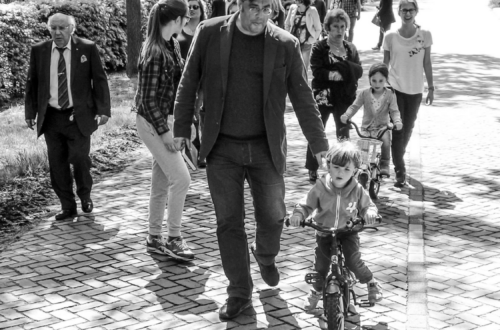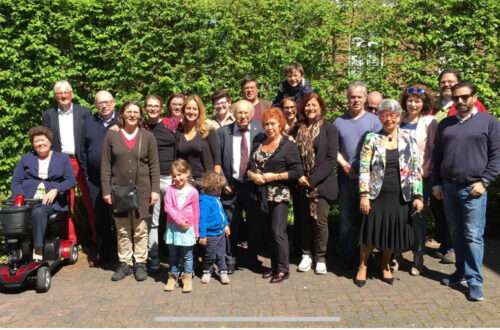חלקה 18 א’, הר הרצל, יום הזכרון 2024.
In the section, there were about 90 new and shiny gravestones. I and a few friends came for Rivka’s grave. Between the narrow paths that cut through the graves, we found ourselves part of a crowd of around 1,000 people trying to push their way through widows, orphans, and bereaved parents to get closer to a patch of ground near someone we knew and who is no longer with us. It felt like everyone got stuck along the way, next to a stranger’s grave, taking the place of someone who should have really been there.
We got relatively close. Part of the time I stood on one leg because there wasn’t room to put down the other. Others climbed onto random objects. The ability to focus on the emotion of longing was replaced by rage that the paramedics couldn’t carve a path through the crowd to a mother who fainted from grief just four graves away from us. And as if that wasn’t enough—Netanyahu began to speak.
Ironically enough, the crowding actually helped me connect with Rivka, whom I was used to seeing only when things were crowded. In 2023, Liel Arbiv brought her to one of the demonstrations against the judicial overhaul, and from there she became our partner in protests. In those days, Kaplan was packed to the brim, and you had no way to reach the friends you planned to meet amid the crowds, surrounded by hundreds of thousands full of courage and hope—and because of the overload, no reception. On Mount Herzl, everyone bowed their heads and cried, and there was no reception either.
Section 18A is the story of our generation. A generation taught that every person is a world unto themselves, and that each individual must be remembered—until suddenly, there are too many dead, and their stories slowly fade into the background of the ever-lengthening list of the fallen and the ongoing suffering of war.
Just like Section 18A, Kaplan wasn’t big enough to contain us all. Rivka was one of those who broke through the police barriers that had fenced us in tightly and led swarms of young people to Ayalon Highway—reducing the pressure and bringing air into the protest. And now Rivka is here, under the ground, unable to break through the barrier, and there’s not much air.
Rivka was a principled woman. She refused to accept the tragedy of our generation. She knew that for each person to truly be a world, this country needs to put people first. She fought for a better society, and she fought in this cursed war, which for two and a half years has brought more and more disasters upon us.
I don’t want Rivka’s story—and the stories of all the other fallen—to be pushed aside by an endless list of more and more names that will keep coming as long as the decision to continue the war stands. They don’t deserve that, and neither do we. To remember Rivka is to remember that there is justice and truth in the world. It is to fight for our values, to break down barriers, and to bring peace and equality to Israel—to give our generation air to breathe.
Thank you for who you were, and sorry that we haven’t yet managed to end the tragedy—but it will happen soon.
ben hoshen
Tel Aviv-Jaffa


